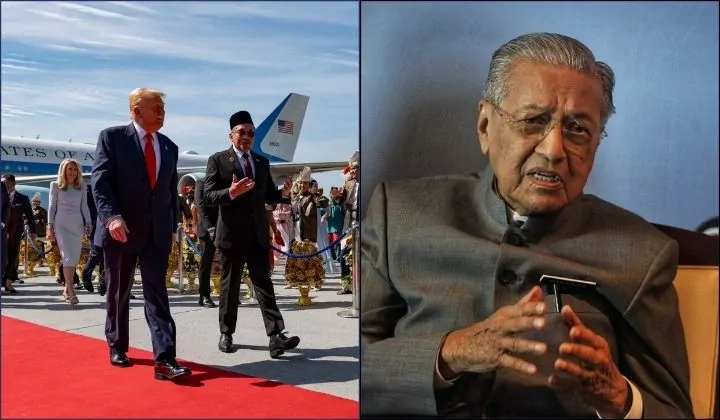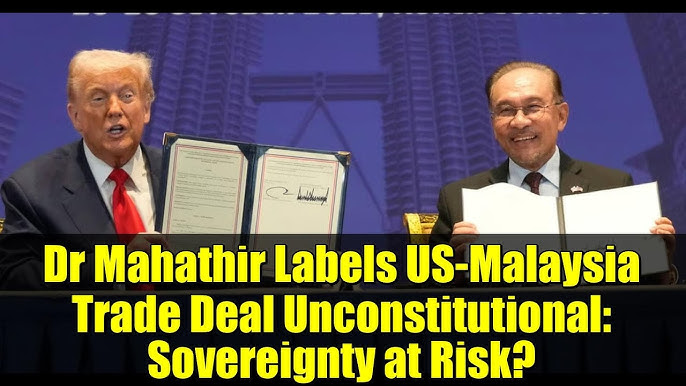The Malays Cannot Hide Behind the NEP Forever.
Malaysia Must Approve the U.S. Trade Pact
— or Collapse Into Isolation.
Part 3 – of 3 Parts
By Damian Fernandez
Editor’s Note
Due to the volume of public reaction, social-media debate and fear-mongering about the U.S.–Malaysia Reciprocal Trade Agreement, this piece forms Part 3 of our 3 part analysis. Parts 1 and 2 explored how the treaty dismantles decades of race-based trade barriers.
Subscribe to our mailing list or follow us on LinkedIn for updates.
————————————————————————————————————
If Parliament blocks the U.S. deal, it’s not courage.
It’s economic suicide dressed as pride.
For the first time in decades, we are standing at a fork in the road: one path leads to growth, capital inflows, global legitimacy — the other back into the swamp of racial patronage, rent-seeking, and shrinking relevance.
The U.S.–Malaysia Reciprocal Trade Agreement isn’t just another memorandum of understanding dressed up for domestic headlines. It’s a structural pivot — one that redefines Malaysia’s place in the global economy. Whether most Malaysians realize it or not, this is the quiet end of a long, corrosive experiment in economic apartheid.
In global markets, the deal is viewed as a bold realignment — one that could propel Malaysia into the center of 21st-century trade. But back home, the reaction has been confused, defensive, and in many quarters, almost hysterical.
Politicians are thumping podiums about sovereignty. Civil servants whisper about losing “Malay privileges.” Social media buzzes with alarm that Donald Trump has somehow rewritten Malaysia’s Constitution. What’s really happening is simpler — and far more profound.
This isn’t about surrender. It’s about survival.
1. Parliament Cannot Afford To Block the US Deal.
The Reciprocal Trade Agreement, announced on October 26, 2025, is not just another memorandum of understanding. It’s a legally binding framework that ties tariff rates, non-tariff barriers, and investment access to reciprocity and transparency.
When Malaysia’s Parliament green-lights the Agreement, (and it will), it will legally bind the country to non-discriminatory investment and trade conditions — the very phrase that MITI used in its own press statement: “Malaysia reaffirms its commitment to provide a level playing field to all investors.”
That single sentence was revolutionary. It effectively codified what the United States Trade Representative had insisted on: reciprocity, transparency, and equality of treatment for all participants in the Malaysian economy.
When the vote passes, Malaysia is locked in. Bumiputra-first quotas, foreign equity caps, selective licensing regimes, and other tools of economic control can no longer be used as instruments of state policy in key trade-linked sectors.
Meanwhile, the White House statement explicitly lists Malaysian pledges to accept U.S. product standards, streamline import licensing, and refrain from digital taxes that target U.S. firms.
Every one of these points dismantles a small but critical piece of the old “Bumiputra First” economic scaffolding.
2. The Economic Consequences of Rejection.
If Parliament fails to ratify the deal, Malaysia risks more than diplomatic embarrassment. The tariff snapback clause allows Washington to immediately reinstate the previous 25% rate — and possibly higher.
That would devastate Malaysia’s export economy, particularly electronics, petrochemicals, and palm oil — all of which depend on U.S. market access. The ringgit would tumble, investor confidence would erode, and long-planned FDI commitments could vanish overnight.
Let’s be blunt: rejecting this deal isn’t defiance. It’s self-harm.
Malaysia’s trading partners — Indonesia, Vietnam, Thailand — are already moving to align their own tariffs and standards under similar reciprocal arrangements. A rejection would make Malaysia the odd one out in ASEAN — a country signalling to investors that race-based politics still matter more than competitiveness.
3. The Political Illusion of Defiance.

Many still insist that foreign agreements cannot touch Malaysia’s constitutional protections for the Malays. But this rests on a profound misunderstanding.
Article 153 of Malaysia’s Constitution was never intended to guarantee lifelong economic privilege. It was meant to safeguard representation — to ensure that Malays and indigenous peoples were not excluded from public service, scholarships, and basic economic and political participation during the fragile post-independence period. It was a protection, not a perpetual monopoly.
Over the decades, however, politicians (especially former Prime Minister, Mahathir Mohamed) turned Article 153 into a political weapon — the justification for the New Economic Policy (NEP) and its web of quotas, ownership mandates, and licensing barriers.
The Reciprocal Trade Agreement doesn’t rewrite the Constitution; it simply makes discrimination impossible in the context of international commerce. When Malaysia agrees not to impose local-ownership rules or racial equity requirements on U.S. and aligned investors, it automatically removes the NEP’s teeth in key sectors.
MITI’s own statement reinforces this, noting Malaysia’s commitment to “a transparent, rules-based trading framework that upholds fair competition.”
The truth is this: for decades, the Bumiputra community has been led to believe — chiefly by former Prime Minister Mahathir Mohamed — that Article 153’s constitutional protections somehow conferred economic privilege. It was an egregious distortion of intent, repurposed to cement his political dominance. By weaponizing race and redefining protection as entitlement, Mahathir built a system that masked his insecurities about his own identity and Indian heritage, even as it shackled the nation’s economic potential.
4. The Quiet Revolution Is Underway.
Even before Parliamentary approval, the effects are visible. The U.S. has already begun adjusting tariff schedules; Malaysian exporters of electronics, medical devices, and automotive components are seeing preferential rates applied under interim measures.
Multinationals that once relocated to Singapore or Vietnam to escape Malaysia’s equity mandates are now reconsidering local expansion.
The 1,200-product exemption list — covering nearly 80% of Malaysia’s export value to the U.S. — was no clerical oversight. It’s Washington’s calculated reward for Malaysia’s willingness to dismantle discriminatory trade barriers.
This is not a loss of sovereignty. It’s a reclamation of credibility.
For decades, Malaysia’s most talented entrepreneurs — especially among its non-Bumiputra and diaspora communities — have fled the country’s economic apartheid. This deal signals that they can come home. That the playing field is finally being leveled not by decree, but by the logic of global trade.
5. The Stakes for Parliament
When Parliament convenes to vote on the treaty, it won’t merely be deciding a tariff rate. It will be defining what kind of nation Malaysia wants to be.
A “no” vote will plunge the country back into the swamp of race politics — a comfort zone for elites who profit from fear.
A “yes” vote will affirm Malaysia’s readiness to stand shoulder to shoulder with the world’s most competitive economies.
If the Dewan Rakyat caves to political pressure and refuses to ratify the Agreement, Malaysia’s economy will be punished — swiftly and silently.
Foreign direct investors will see it as confirmation that Malaysia is incapable of reform, that race-based policy making still overrides economics. The message would be clear: Malaysia wants the world’s capital, but on its own discriminatory terms.
Make no mistake: the global business community is watching. Washington’s 19% tariff rate is contingent. If Malaysia hesitates or reverses course, the deal collapses and tariffs rebound overnight. Billions in trade evaporate.
This vote will show if Malaysia wants global growth — or just more excuses wrapped in race politics.
6. The Broader Truth.
The Reciprocal Trade Agreement doesn’t undermine Malay rights; it restores Malaysian dignity. For half a century, the NEP reduced one of Asia’s most promising economies into a racially divided, self-limiting state.
Anwar, Zafrul, and the Quiet Recalibration
Whatever your political leanings, give credit where it’s due. Prime Minister Anwar Ibrahim and Trade Minister Tengku Zafrul Aziz have managed the impossible — beginning to unwind the NEP’s economic excesses without triggering a street revolt.
They’ve negotiated with Washington from a position of maturity, not dependency. By embedding reform in a legally binding international framework, they’ve done something Malaysia has never dared before: tie its own hands to prevent backsliding.
The trade deal is Malaysia’s economic rehab plan — one that locks the door to relapse.Now, with the stroke of a pen — and a handshake in Washington — Malaysia is being guided to an exit ramp.
The question is whether its leaders will take the correct path.
“If Parliament blocks the U.S. trade pact, it’s not courage — it’s economic suicide dressed as pride.”
— From the U.S.–Malaysia Reciprocal Trade Agreement Analysis, Oct 2025.





